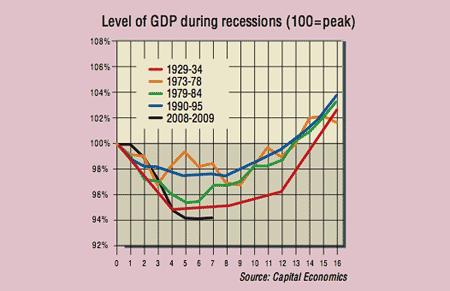Get the latest financial news, insights and expert analysis from our award-winning MoneyWeek team, to help you understand what really matters when it comes to your finances.
You are now subscribed
Your newsletter sign-up was successful
Want to add more newsletters?

Twice daily
MoneyWeek
Get the latest financial news, insights and expert analysis from our award-winning MoneyWeek team, to help you understand what really matters when it comes to your finances.

Four times a week
Look After My Bills
Sign up to our free money-saving newsletter, filled with the latest news and expert advice to help you find the best tips and deals for managing your bills. Start saving today!
"Never has an end to a recession been so underwhelming," as Colin Ellis of Daiwa Capital Markets put it. Britain barely returned to growth in the fourth quarter, with GDP rising by 0.1%, far below the 0.4% widely expected. Technically that brings to an end the longest and deepest recession since the 1930s, a six-quarter stretch that saw GDP slide by 6.1% from peak-to-trough. We are the last G7 economy to come out of recession.
What the commentators said
"Rarely can so much have done so little for so many," said Ian Campbell on Breakingviews. The UK's monetary and fiscal stimulus has been huge, yet all we could eke out this quarter was 0.1%. That's because we, unlike others, had become "unhealthily reliant on the City and debt-driven consumption", said Edmund Conway in The Daily Telegraph. The crisis caused these growth drivers to "evaporate overnight". With the banks so damaged and loath to lend, the economy has ground to a halt and will only recover slowly. Recessions caused by financial crises leave deep scars.
It's certainly hard to see where growth will come from. Consumers have started paying down household debts that reached 181% of disposable income last year. But "they still have a long way to go before they will be reliable big spenders", said the Financial Times. It doesn't help that unemployment may rise further as the public sector loses jobs in the squeeze, while taxes increases are "certain", said Campbell.
MoneyWeek
Subscribe to MoneyWeek today and get your first six magazine issues absolutely FREE

Sign up to Money Morning
Don't miss the latest investment and personal finances news, market analysis, plus money-saving tips with our free twice-daily newsletter
Don't miss the latest investment and personal finances news, market analysis, plus money-saving tips with our free twice-daily newsletter

That broaches the next problem: the government is cutting back to trim the towering budget deficit, so it won't provide any demand. That leaves the external sector. But the plunge in sterling has barely lifted exports so far. And our main trading partner is the eurozone, "with its fine manufacturers and cowed consumers". Add it all up and a double-dip is a distinct possibility.
Another worry is that the lacklustre growth figure means the government's revenue targets won't be met and so borrowing will have to rise even further, said David Prosser in The Independent. And the higher overall debt rises, the greater the drag on growth, so there is the danger of a vicious cycle. Confidence in Britain's debt is dwindling. Bill Gross, the world's biggest bond investor, has warned that Britain could face a ratings downgrade, and this week said "gilts are resting on a bed of nitroglycerine". So at worst we could face a sterling and sovereign debt crisis, said Allister Heath in City AM; at best, "years of sluggish growth".
Get the latest financial news, insights and expert analysis from our award-winning MoneyWeek team, to help you understand what really matters when it comes to your finances.
MoneyWeek is written by a team of experienced and award-winning journalists, plus expert columnists. As well as daily digital news and features, MoneyWeek also publishes a weekly magazine, covering investing and personal finance. From share tips, pensions, gold to practical investment tips - we provide a round-up to help you make money and keep it.
-
 Should you buy an active ETF?
Should you buy an active ETF?ETFs are often mischaracterised as passive products, but they can be a convenient way to add active management to your portfolio
-
 Power up your pension before 5 April – easy ways to save before the tax year end
Power up your pension before 5 April – easy ways to save before the tax year endWith the end of the tax year looming, pension savers currently have a window to review and maximise what’s going into their retirement funds – we look at how

